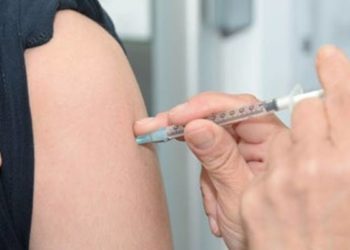Preterm infants responsive to PCV13 vaccine
1. Compared to term infants, preterm infants had lower anti-pneumococcal IgG concentrations after administration of the 13-valent pneumococcal conjugate vaccine (PCV13). However, the majority of both groups achieved a titer level above that recommended for adequate protection.
2. Opsonophagocytic activity of the antibodies in both term and preterm infants was similar, indicating an equally effective response to the PCV13 vaccine. At the same time, there was no significant difference in the safety profiles for the groups.
Evidence Rating Level: 2 (Good)
Study Rundown: Preterm infants are at increased risk for numerous health complications, including invasive pneumococcal disease. Previous studies have demonstrated an effect of gestational age and timing on the response by preterm infants to vaccines. This study was the first to compare the response of preterm infants to the PCV13 vaccine to that of term infants. Preterm and term infants were administered the PCV13 vaccine as an infant series followed by a toddler dose. One month after the infant series, both groups achieved a clinically significant IgG antibody response rate. While still within a therapeutic level, the preterm group had significantly lower IgG levels. Both groups responded even more robustly to the toddler dose. Differences in antibody activity between the 2 groups was less significant, though still remained significantly lower in preterm infants in nearly half of the pneumococcal serotypes. The second aim of the study was to examine the safety profile of the vaccine, and found that this vaccine was well tolerated among preterm infants, with no new safety concerns. While limited by the sample size and its racial homogeneity, the results of this study further strengthen the efficacy, need, and safety of timely vaccination of all infants.
Click to read the study published in Pediatrics
Relevant Reading: Efficacy, immunogenicity and safety of heptavalent pneumococcal conjugate vaccine in low birth weight and preterm infants
In-Depth [prospective cohort]: This study analyzed the response of 100 preterm and 100 term infants from 5 sites in Poland and 6 sites in Spain to the PCV13 vaccine given at 2, 3, 4 (infant series) and 12 (toddler dose) months. Blood samples were obtained 1 month after the conclusion of both the infant series and toddler dose. Anticapsular IgG antibody levels and functional antibody responses were measured. After the toddler series, >85% of infants achieved the recommended ≥35 μg/mL level with statistically significant differences in levels between preterm and term infants. Greater than 97% of subjects achieved this level after the toddler dose, with no statistically significant difference between the two gestational age groups. The activity level of these antibodies was also measured, and showed decreased levels in preterm infants though to a lesser extent than the difference in IgG levels. After the toddler dose, activity levels were lower among preterm infants for 6 out of 13 serotypes. Finally, parents were asked to report adverse events. There was a nonsignificant difference in the incidence of overall systemic adverse events among term and preterm infants (5% vs. 14%, p = .051), with no new safety concerns.
Image: PD
©2015 2 Minute Medicine, Inc. All rights reserved. No works may be reproduced without expressed written consent from 2 Minute Medicine, Inc. Inquire about licensing here. No article should be construed as medical advice and is not intended as such by the authors or by 2 Minute Medicine, Inc.


![2 Minute Medicine: Pharma Roundup: Price Hikes, Breakthrough Approvals, Legal Showdowns, Biotech Expansion, and Europe’s Pricing Debate [May 12nd, 2025]](https://www.2minutemedicine.com/wp-content/uploads/2025/05/ChatGPT-Image-May-12-2025-at-10_22_23-AM-350x250.png)

![CT coronary angiography clarifies diagnosis in patients with suspected angina due to coronary heart disease [SCOT-HEART trial]](https://www.2minutemedicine.com/wp-content/uploads/2015/03/Ct-angiography-75x75.png)


